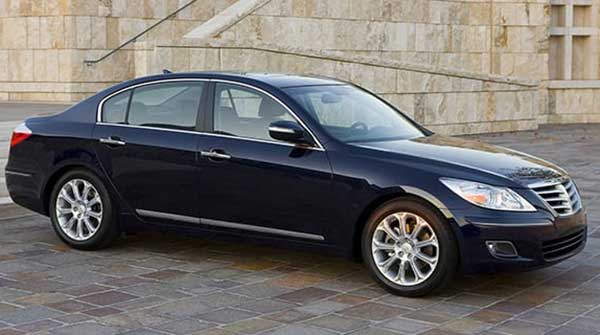The 2010 Hyundai Genesis manages to feel upscale without overdoing it
 By any measure, the Genesis was a significant step forward for the Korean carmaker Hyundai and a worthy contender in the upscale sedan market. It also became the company’s flagship model, supplanting the Azera.
By any measure, the Genesis was a significant step forward for the Korean carmaker Hyundai and a worthy contender in the upscale sedan market. It also became the company’s flagship model, supplanting the Azera.
It is worth noting that the Genesis was rear-wheel drive and was not built on any existing platform. This was a brand-new car from end to end, representing a complete market shift for Hyundai.
In 2010, there were two versions of the sedan. A coupe came a little later. Power was delivered by a 3.8-litre V6 engine or a 4.6-litre Tau V8. Although the V6 powerplant had been around for a while (used in the Azera, for example), the engine powering the latter version of the Genesis was all-new for the company and featured Hyundai’s in-house variable valve timing system. Hyundai claimed it’d take the 1,869-kilogram Genesis from a standing start to 100 km/h in less than six seconds. Interestingly, it developed 375 horsepower running on premium grade gas and seven less on regular.
 The 2010 Hyundai Genesis definitely projects luxury and presence and the interior is comfortable with good ergonomics. And even the base model is loaded. |
| Related Stories |
| 2010 car reviews
|
| Used cars
|
Both engines were mated to a six-speed automatic transmission only, with Hyundai’s Shiftronic manual shift feature, traction control and vehicle stability systems, and the V8 came with a limited slip differential as standard equipment.
The Genesis definitely projected luxury and presence and, although a tad generic, was very easy on the eyes. Ditto with the interior, which was about as comfortable as these things get and featured graceful lines everywhere and simple, understandable ergonomics for the instrumentation and switchgear.
But, arguably, the Genesis’ strongest point was its equipment level. Even the base model was loaded, with a full leather interior, dual-zone climate control system, tasteful wood trim, steering wheel-mounted controls, XM satellite radio, heated front seats, heated outside mirrors, power tilt/telescoping steering, and Bluetooth capability coming standard.
With the technology package, you could also order a navigation system, ventilated driver’s seat, rear window sunshade, and a tilt/slide power sunroof with shade.
It may have been Hyundai’s first foray into luxury car territory, but the Genesis managed to make this car feel upscale without overdoing it.
How has it stood up in the intervening years?
Not completely trouble-free, but not bad. The good news is that, in 2010, there were no safety recalls to report, either with Transport Canada or the U.S. National Highway Traffic Safety Administration. However, the latter organization had some 30 technical service bulletins on file, ranging from “harsh shifting” issues with the transmission to problems with the fuel filler door to wonky brake lights that blink on and off at random. Also plenty of software and electrical updates and advisories for service personnel.
Consumer Reports was on the fence with this one. It appreciated the Genesis’s value for money factor but had apprehensions about its “nervous” ride, power equipment and fuel system. The 2010 edition got an “average” used car prediction from this organization. Some comments from owners: “for the price, you can’t beat it,” “brakes squeak in reverse on cold days,” “ride is unsettled and bumpy,” and “don’t be concerned about this being a Hyundai.”
Marketing researcher J.D. Power gave the 2010 Hyundai Genesis top marks for overall performance, design, and dependability. It also scored well for comfort and interior features. In short, this organization appears to like this one.
Expect to pay anywhere from about $7,000 to the low to mid-teens for the V6 and another $3,000 to $5,000 for the V8.
2010 Hyundai Genesis sedan
Original base price: $37,995 and $43,995
Engine: 3.8-litre V6 and 4.6-litre V8
Horsepower/torque: 290/375 horsepower; 264/385 foot pounds
Transmission: Six-speed automatic with manual shift feature
Fuel economy: 12.6 litres/100 km city/8.1 highway (V8) with regular or premium gas.
Alternatives: Toyota Avalon, Pontiac G8, Ford Taurus, Nissan Maxima, Dodge Charger SXT, Mazda6, Honda Accord V6, Acura TL, Infiniti G37, Cadillac CTS, BMW 5-series.
Ted Laturnus has been an automotive journalist since 1976. He has been named Canadian Automotive Journalist of the Year twice and is past president of the Automotive Journalists Association of Canada (AJAC).
For interview requests, click here.
The opinions expressed by our columnists and contributors are theirs alone and do not inherently or expressly reflect the views of our publication.
© Troy Media
Troy Media is an editorial content provider to media outlets and its own hosted community news outlets across Canada.

